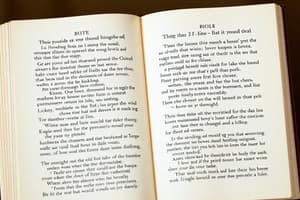Podcast
Questions and Answers
Match the following literary terms with their definitions:
Match the following literary terms with their definitions:
Personification = A figure of speech in which a non-human subject is given human qualities. Simile = A comparison between two unlike things using "like" or "as." Connotation = The emotional or cultural associations surrounding a word, beyond its literal meaning. Denotation = The explicit or literal meaning of a word, free from emotional coloration or association.
Match the following literary terms with their definitions:
Match the following literary terms with their definitions:
Imagery = The use of vivid language to create mental images in the reader's mind. Allusion = A reference to another work of literature, person, or event. Irony = A literary technique in which events or situations turn out differently from what one would normally expect. Symbolism = The use of symbols to represent ideas or qualities.
Match the following literary terms with their definitions:
Match the following literary terms with their definitions:
Mood = The overall emotional atmosphere of a work of literature. Alliteration = The repetition of consonant sounds at the beginning of words in close proximity. Personification = A figure of speech in which a non-human subject is given human qualities. Connotation = The emotional or cultural associations surrounding a word, beyond its literal meaning.
Match the following literary terms with their definitions:
Match the following literary terms with their definitions:
Match the following literary terms with their definitions:
Match the following literary terms with their definitions:
Match the following literary terms with their definitions:
Match the following literary terms with their definitions:
Match the following literary terms with their definitions:
Match the following literary terms with their definitions:
Match the following literary terms with their definitions:
Match the following literary terms with their definitions:
Match the following literary terms with their definitions:
Match the following literary terms with their definitions:
Match the following literary terms with their definitions:
Match the following literary terms with their definitions:
Flashcards are hidden until you start studying
Study Notes
Literary Terms
- No literary terms are provided to match with their definitions.
Studying That Suits You
Use AI to generate personalized quizzes and flashcards to suit your learning preferences.




